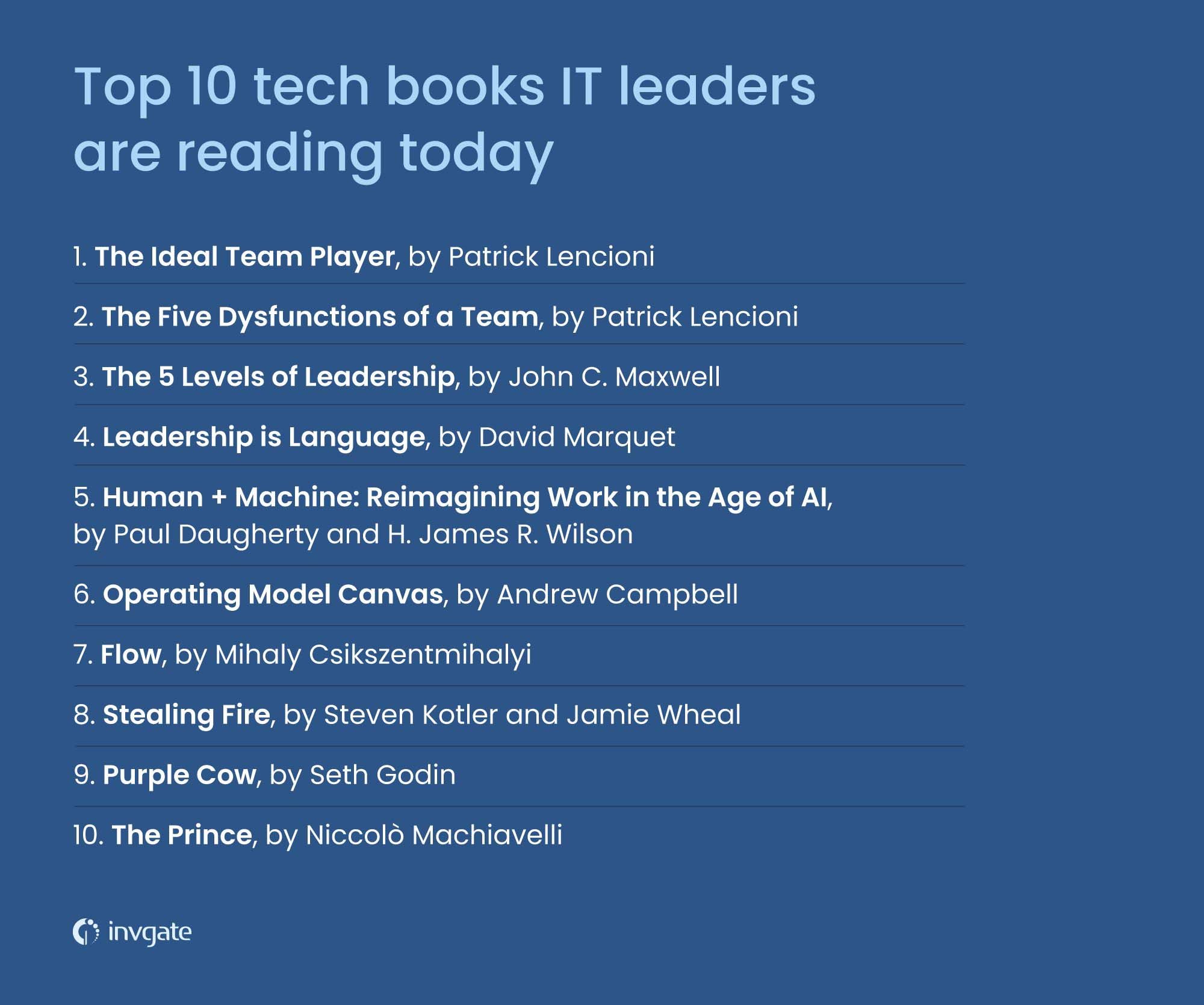In a rapidly changing field like technology, it's essential for IT leaders to stay up-to-date on the latest trends. And one of the best ways to do this is by reading thought-provoking tech books.
In general terms, there are two kinds of books you can read. The first group consists of technical texts or those focused on frameworks, best practices, and other formal topics you want to expand your knowledge on. And since we already have a thorough list of 14 ITSM books, we're about to focus on the second group.
We're talking about the ones that teach us more intangible things, the ones about leadership, communication, time management, and all the soft skills that are crucial to IT professionals but not necessarily exclusive to a role.
These are the books IT leaders are reading today, those that help them to be better managers, empathize with their teams, and make work a better place.
And how do we know that? Because that's what the guest of our tech podcast Ticket Volume are telling us! Here's a compilation of the top 10 tech books Ticket Volume's guest leaders are reading (and recommending).

Top 10 Tech Books IT Leaders Are Reading Today
1. “The Ideal Team Player,” by Patrick Lencioni
The first book on the list is actually a must-read for IT leaders. In "The Ideal Team Player," Patrick Lencioni provides a framework for what he believes are the three essential virtues of an ideal team player: humility, hunger, and people smarts.
This is a book recommended by several of our Ticket Volume’s guests. It was one of the ones featured in a leadership course session at Midrex oriented to managers and directors to improve recruitment, retention, and performance management. And it made quite an impression on Danny Kateli, its Manager of IT Operations.
|
|
“I’m very passionate about humble, hungry, smart. And so, we are recruiting humble, hungry, smart people; we’re retaining the same type of people, and we are managing and leading from that same lens.” Danny Kateli |
The thing is that, while tech books typically focus on hard skills, "The Ideal Team Player" casts a spotlight on the importance of soft skills in building a successful team, making this a valuable resource for leaders and managers for understanding how to identify and develop the key characteristics that will lead to a high-performing team.
In this sense, Niko Miller also pointed out back in Episode 18 that, “what we know, what we’re convinced of, and what we’ve seen over time is that we can teach people to do the account unlocks the password resets, all the work that a service desk does. But what we can’t teach is these underlying values of humble, hungry, smart that come from Patrick Lencioni’s Ideal Team Player.”
With its insights into human behavior and team dynamics, “The Ideal Team Player” is indispensable for anyone looking to build an effective and cohesive team.
2. "The Five Dysfunctions of a Team," by Patrick Lencioni
And since we started with Lencioni, let’s continue with another one of his brightest books (did anyone notice we’re also fans of his work?). “The Five Dysfunctions of a Team” explores the idea that there are five main reasons why teams fail to function properly: lack of trust, fear of conflict, lack of commitment, lack of accountability, and inattention to results.
|
|
“‘The Five Dysfunctions of a Team’ equips the team to see the end-user, no matter the technical issue that they’re experiencing. To be truly empathetic, understanding, to really lean in, listen, solve the right thing. We talk about connecting and understanding, before just jumping into act.” Niko Miller |
The most enriching aspect of this tech book is perhaps the fact that Lencioni based it on his own experiences as an IT leader. He attempted to explore each of these dysfunctions in detail and provide practical advice on how to overcome them.
So, given the fact that he ended up providing a theoretical framework for understanding and addressing the challenges that teams face, you can easily see why this book is also a favorite of our IT leaders.
And just a quick tip before moving on to the next one on the list: this is one of Matt Beran’s favorites as well! In fact, he always encourages people to pick the comic book version of "Five Dysfunctions of a Team." "If you like comic books or graphic novels, definitely pick it up. It's one of my favorite comic books of all time, which is really nerdy to say," the host of Ticket Volume revealed on Episode 15.

3. The 5 Levels of Leadership, by John C. Maxwell
Apparently, five is the lucky number! In “The 5 Levels of Leadership,” John C. Maxwell outlines the stages that every leader progresses through, from Position to Permission, to Production, to People Development, to Pinnacle.
|
|
“I’m a huge John Maxwell fan. And even my learning has evolved. I say I’m a practitioner of leadership, not just a theorist. So, I’ll take some of those theories and put them into practice.” NJ Robinson |
The author argues that IT leaders must move beyond simply managing their teams and focus on developing their people if they want to reach the Pinnacle level. This requires creating a culture of trust and respect, where people feel empowered to reach their full potential. In this sense, managers who follow Maxwell's advice should be able to create organizations that are more innovative and responsive to change.
4. "Leadership is Language," by David Marquet
Next on the top 10 tech books IT leaders are reading today is “Leadership is Language,” by David Marquet. This is a great resource to think specifically about how language can impact leadership.
In short, Marquet explains that the way leaders speak and write sets the tone for their organizations. As such, IT leaders need to be mindful of the language they use when communicating with their teams – meaning, for instance, that they should avoid using jargon and instead focus on clear, concise communication.
|
|
“David Marquet very clearly says one of the most dangerous words in leadership is the word empower. Because you feel like you’ve just given your team gifts and abilities far beyond those of mortal man, and they want you to not do that.” Daniel Breston |
By making language the focal point, IT leaders can create a shared understanding amongst their team and help to promote a positive working environment.
In addition – and if you needed an extra reason to add this to your reading list – the author discusses how leaders can use language to empower their team members and encourage them to take ownership of their work. So, David Marquet’s book is perfect for IT professionals looking to improve their communication skills.

5. "Human + Machine: Reimagining Work in the Age of AI," by Paul Daugherty and H. James R. Wilson
In “Human + Machine,” Paul Daugherty and James Wilson explore how artificial intelligence is changing the workplace, and they offer guidance on how IT leaders can best prepare for this shift.
The book – recommended by Roy Atkinson – provides an overview of AI technologies and their potential applications, as well as insights on how to manage AI initiatives and maximize their benefits.
|
|
“‘Human + Machine’ is a great book that talks about the skills that humans have, and the skills that machines have, and how those can be blended together. Roy Atkinson |
Though it goes back a few years, this book remains a key reading to understand the opportunities and challenges posed by AI.
6. “Operating Model Canvas,” by Andrew Campbell
And since we’re talking about reimagining work, “Operating Model Canvas” invites readers to think about their work in a new way.
Andrew Campbell covers the topic of business model design and provides a detailed guide to creating an operating model canvas. Furthermore, it addresses the difficulties that can arise when attempting to map out an operating model and provides a case study that demonstrates how the canvas can be used in practice.
|
|
“Andrew’s model is an instrument to visualize either what you’re doing today or what you want to do tomorrow so that you can think about how you can get there. It's a great tool to visualize how you do stuff. You can depict this as a big one-pager at a high level, but you could also do an operating model detailed in a hundred pages.” Mark Smalley |
Overall, “Operating Model Canvas” is a valuable resource for IT leaders looking to improve their business model design skills.

7. “Flow,” by Mihaly Csikszentmihalyi
Next on the list is “Flow,” by Mihaly Csikszentmihalyi. Recommended by Simone Jo Moore on Episode 23, this book is the foundation of the idea of flow state or the experience of being completely absorbed in an activity – which can occur when we are engaged in an activity that is challenging but not overwhelming.
|
|
“There’s ease, and dis-ease, this is the way it goes. So, when we get the dis-ease is when we find that we’ve gotten to the end of our energy levels, we can only sustain [the flow state] for so long. Then, we go into repair mode, and that’s our recovery. Simone Jo Moore |
For IT leaders, flow state can be achieved by focusing on tasks that are both important and interesting, and by setting realistic goals that stretch their abilities. And, as you may imagine, this approach can work both for managers and their teams since it has the potential to create an environment in which everyone can thrive and reach their full potential.
8. “Stealing Fire,” by Steven Kotler and Jamie Wheal
And if the previous one was from the founder of Flow Science, “Stealing Fire” is from one of its co-founders. Steven Kotler and Jamie Wheal’s book is about how to harness the power of flow states to achieve peak performance.
The book discusses the latest research on Flow State physiology and psychology and provides practical tips for IT leaders on how to induce Flow States in their teams. Also recommended by Simone Jo Moore, it has received rave reviews from leaders in the field of IT and is a must-read for anyone looking to take their team's performance to the next level.
9. “Purple Cow,” by Seth Godin
In “Purple Cow,” Seth Godin argues that the key to success in the 21st century is to stand out from the crowd – which makes it another clever recommendation from Mark Smalley.
In this book, the author discusses how the rise of mass media and mass marketing has made it more difficult for individual products and businesses to stand out. As a result, he advises companies to focus on creating something truly remarkable, or what he calls a "purple cow."
While this may seem like common sense, Godin's book provides a fresh perspective on how to succeed in today's economy. So, IT leaders can benefit by using its insights to create innovative products and services that will capture attention and drive growth.
10. "The Prince," by Niccolò Machiavelli
We’ll finish up this reading list with somewhat of an unorthodox recommendation. “The Prince,” by Niccolò Machiavelli is essentially a book about how to gain and maintain political power. Though it was written in 1532 – hence, its concern about royalty – its core principles can adjust to current times.
|
|
“Machiavelli is an absolutely brilliant insight into human nature. He’s talking about a prince, but it’s equally applicable to managers. Mark Smalley |
Key takeaways
We've reached the end of the list, and though we know for a fact that it could be expanded endlessly, we think ten is a great number to start your 2023 with a concise yet varied pack of books.
As we said at the beginning, the IT leaders that appeared on Ticket Volume mostly shared reading materials that have to do with what seems to be the hardest skill to train: the ability to connect and lead people. If we were to summarize the ideas behind this list of tech books, we'll say that they focus on:
- Selecting tasks that are both important and interesting.
- Set realistic goals that push your team members to grow and develop their skills
- Create environments prone to achieve peak performance and reaching full potential.
- Nurture a culture of trust and support in the organization.
So, if you were looking for inspiration (or perhaps some Christmas presents), then here's everything you need. Make sure to pick the ones that interest you the most, and don't forget that reading is not enough; you also have to implement their tips and ideas to close the circle and be a better IT leader!















